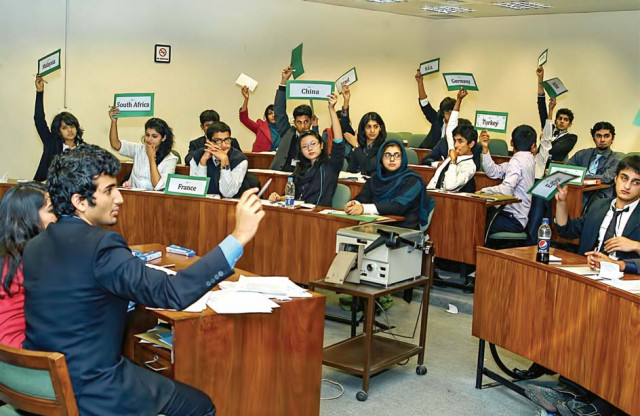LUMS Model United Nations: A day of great debates
India's permenant place on the UNSC, private militaries and nuclear Pakistan discussed.

LUMS Model United Nations: A day of great debates
India’s growing economy, apart from its status as the world’s biggest democracy and its military strength went in the country’s favour. Karachi Grammar School student, Meer Moeen, who represented USA, along with the delegates of Mexico, South Korea and Uganda said that India should be given a permanent seat. Others said that India had to ‘earn’ the seat by resolving its internal problems. The economic disparity across the country and its lukewarm attempts to resolve the Kashmir issue with its neighbour, Pakistan, were the biggest criticisms. Brazil also expressed its concerns that a concentration of power in the East would cause an inequality of power globally.
A resolution has been drafted on the issue and will be put up for approval on Sunday.
The UNSC proceedings were only one of the 16 issues debated on the second day of the seventh annual LUMS Model United Nations Conference.
In the UN’s Human Rights Commission committee meeting, delegatescalled for the regulation and accountability of private military companies (PMC). Bosnian and Afghan delegations maintained that there should be a complete ban on PMCs because there would always be loopholes in mechanisms for their accountability. However, the US delegate vehemently opposed a ban and observed that PMCs were being hired by the United States to aid it in resolving internal civil disputes and maintaining peace in conflict areas. The delegate called the ban “impractical”.
Human rights violations by the PMCs were also debated at length. United Kingdom and China said that international law did not apply to PMCs.
The Kashmir Dispute was voted on during the discussion of the Special Political and Decolonisation committee (SPECPOL). India blamed Pakistan for the insurgency in Kashmir. After the delegate’s fiery opening speech, other countries took the floor with stances that varied. There were calls for allowing Kashmir the right to self determination, to getting India and Pakistan to partake in successful diplomatic negotiations and a strict UN intervention. One delegate even proposed that China should take over Kashmir. During the debate, the 4’3” Italian delegate coined for himself the name ‘Little Italy.’
Other committees discussed rehabilitation of Pakistan’s flood victims and US’ invasion of Iraq while the Project Committee involving individuals instead of countries suggested solutions to the various problems faced by the Internally Displaced People (IDP).
During the Historical General Assembly (HGA) session, the Iraq invasion was discussed. Russia, France, KSA, Afghanistan, Germany, Austria, South Africa and Iran, to name a few, condemned the military strikes by the US. Discord prevailed as the UK, Japan, Israel, Belgium, Egypt, Australia, Rwanda and Columbia defended the US invasion as part of an extended international peace process.
The Disarmament and International Security (DISECA) committee focused on Pakistan’s role in nuclear proliferation.
During the debate, it was evident that most countries believed that Pakistan could not protect its nuclear arsenal. They demanded that Pakistan sign the Nuclear Non-Proliferation Treaty (NPT). The Pakistani delegation argued that Pakistan was not the only one who had not signed the NPT. Fingers were also pointed at Abdul Qadeer Khan. However, India lost this debate because the delegate withdrew after losing all her research. The committee chair had to appoint a MUN proxy. Even though the proxy argued eloquently, the committee missed the Indian delegate’s ‘Namaste’.
Published in The Express Tribune, December 25th, 2010.



















COMMENTS
Comments are moderated and generally will be posted if they are on-topic and not abusive.
For more information, please see our Comments FAQ